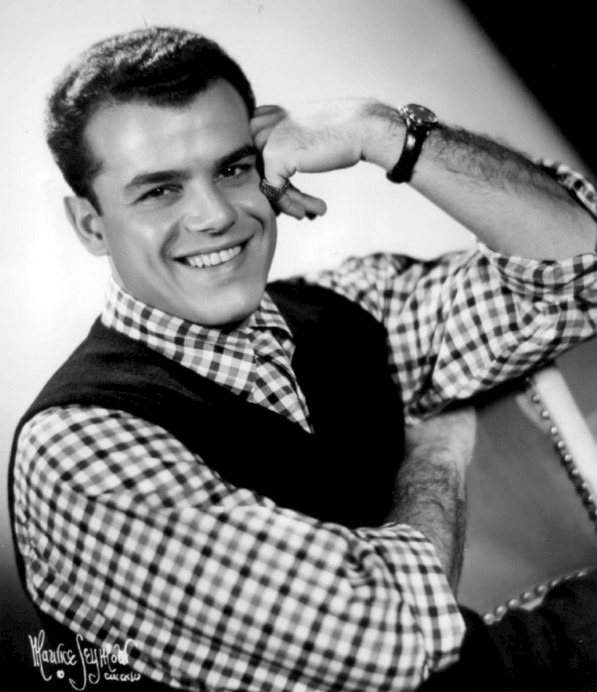Julius LaRosa is a traditional pop singer and television and radio personality whose career started during the 1950s.
A quick overview of Julius LaRosa’s career
Julius LaRosa is an American singer in the traditional vein. His career became particularly prominent in the 1950s. He was born in Brooklyn, New York, in 1930. Throughout his career he had five singles that made to the US Top 20. “Anywhere I Wander” was his first single (and his label Cadence Record’s first release as well) which hit at #4 in 1953 music charts. They were followed by other hits such as “Domani,” “Suddenly, There’s A Valley,” “Lipstick and Candy and Rubbersole Shoes” and the runaway hit “Eh, Cumpari,” which peaked at #2. LaRosa was also a mainstay on the popular TV variety show Arthur Godfrey and His Friends. Later in his career he hosted his own TV show, was also an occasional actor and a successful disc jockey.
Beginnings and rise to fame (under Arthur Godfrey’s wings)
Julius LaRosa (or sometimes billed as Julius La Rosa and even Julius Larosa) was born in Brooklyn New York on January 2, 1930. He is of Italian descent.
After he finished high school, LaRosa worked for the radio before he was enlisted in the US Navy. He was then stationed at Pensacola, Florida when famous television host Arthur Godfrey happened to find him singing. Godfrey was a Naval reserve officer at that time of discovering LaRosa. Godfrey asked LaRosa to come to him after the latter’s stint in the Navy.
Shortly after LaRosa was discharged from the Navy, he first appeared on Godfrey’s variety show in November 1951. LaRosa eventually appeared on both Godfrey’s morning show and then evening program Arthur Godfrey and His Friends.
LaRosa stayed under Godfrey’s wings until October 1953. Godfrey’s shows helped magnify LaRosa’s name and popularity. During his time with Godfrey and singing in his shows, in 1952 he was signed to the fledgling label Cadence Records which was established by Archie Bleyer, Godfrey’s bandleader.
During his time with Godfrey, LaRosa was at odds with the famed (or infamous) television host. Godfrey refused LaRosa to hire his own manager or booking agent, among other issues. In October 1953, Godfrey fired LaRosa on the air in a “subtle” fashion, saying LaRosa’s singing Hart-Rodgers tune “Manhattan” was a “swan song”. Godfrey’s live-broadcast dismissal of LaRosa sparked a bit of controversy that time.
On Cadence Records, LaRosa scored his first big hits with the Frank Loesser-penned “Anywhere I Wander” (#4 on the Billboard Hot 100), and his highest-charting single “Eh, Cumpari” (at #2), both charting in 1953. “Eh, Cumpari,” with both English and Italian (Sicilian) lyrics, was co-written by LaRosa and Bleyer. Because of the success of “Eh, Cumpari,” LaRosa received an award as the year’s best new male vocalist.
LaRosa’s other Cadence hits include “Domani (Tomorrow)” (at #13), “Suddenly There’s A Valley” (at #20), and “Lipstick & Candy & Rubbersole Shoes” (at #15). He also signed to RCA label, and his most successful single there being “Torero” (at #21). There were a few minor hits such as “I’ve Got Love,” “Get Me To the Church On Time,” “Mama Guitar,” and “You’re Gonna Hear From Me” (his last charting single in 1966, this time with MGM label).
Later career
After he was fired by Godfrey, LaRosa was immediately signed by Ed Sullivan and had him perform on the TV variety show Toast of the Town (which was to becomeThe Ed Sullivan Show). LaRosa also hosted his own TV musical variety series. He also began to sing in clubs, most especially around the Las Vegas circuit.
LaRosa’s biggest break came in the late 1960s where he was employed as a disc jockey for WNEW (now WBBR) station in New York. His eight-year stint as a DJ was quite successful, until a change of management at the station occurred and his contract was not renewed. As of the late 1990s, he worked for a local New Jersey radio station WSNW. Up to the 21st century, LaRosa has continued to be active singing and performing, mostly as an interpreter of the Great American songbook.
